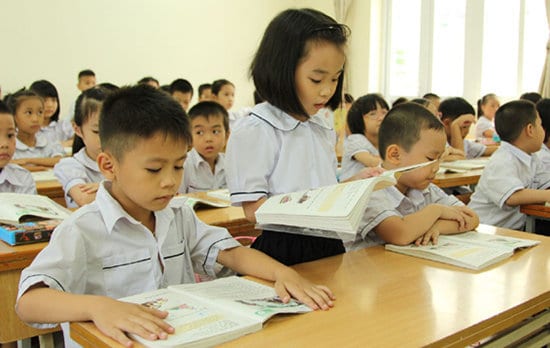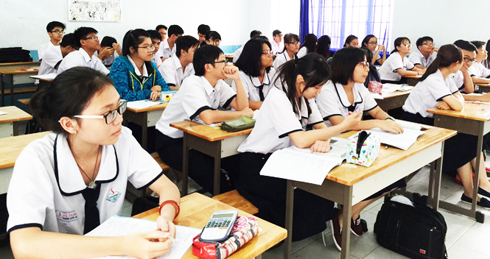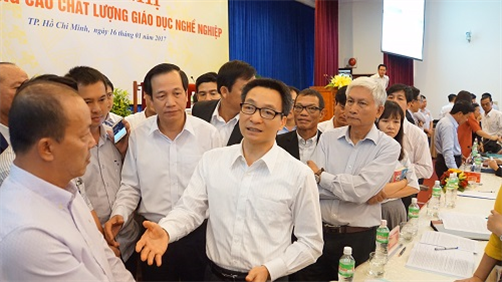From October 20, 2020, Circular 27/2020/TT-BGDDT promulgating the Regulations on assessment of primary school students in Vietnam will take effect. 10 new regulations on the assessment of primary school students will be applied. To be specific:

Hanoi-Vietnam: 10 regulations on assessment of primary school students from October 20, 2020 (Illustration)
1. Assessment roadmap
Article 2 Circular 27/2020/TT-BGDDT stipulates the assessment roadmap for primary school students in Vietnam is specified as follows:
- Grade 1: From the school year 2020-2021
- Grade 2: From the 2021-2022 school year
- Grade 3: From the 2022-2023 school year
- Grade 4: From the 2023-2024 school year
- Grade 5: From the 2024-2025 school year
2. Teachers flexibly use methods for continuous assessment
Article 6 of Circular 27/2020/TT-BGDDT outlines the continuous assessment of the content of subjects and educational activities as follows:
- Teachers flexibly and appropriately use assessment methods, primarily through verbal comments to point out correct and incorrect areas and ways to correct them; writing comments in students' notebooks or products when necessary, and specific measures to help promptly.
- Students self-comment and participate in commenting on their own and group products during the learning process to improve.
- Parents discuss with teachers about students' assessments and comments through appropriate forms and cooperate with teachers to encourage and help students study and practice.
Regarding the continuous assessment of the formation and development of qualities and competencies:
- Teachers flexibly and appropriately use assessment methods; based on the expressions of students' cognition, behavior, and attitudes; refer to the specific requirements for each main quality and core competency according to the Primary Education Curriculum to comment and provide timely support.
- Students self-comment and participate in commenting on their own and group expressions of each main quality and core competency to improve themselves.
- Parents discuss and cooperate with teachers to encourage and help students to practice and develop each main quality and core competency.
Currently, under Article 6 Circular 30/2014/TT-BGDDT amended and supplemented by Circular 22/2016/TT-BGDDT, teachers only use verbal comments to point out correct and incorrect areas and ways to correct them; write comments in students' notebooks or products when necessary, and specific measures to help promptly; based on students' cognition, skills, and attitudes on each competency and quality to comment and provide timely support; students self-comment and participate in commenting on their own and group expressions of each competency and quality to improve themselves; encourage parents to discuss, cooperate with teachers to encourage and help students practice and develop competencies and qualities.
From October 20, 2020, teachers are allowed to flexibly and appropriately use assessment methods and must refer to the specific requirements for each main quality and core competency according to the Primary Education Curriculum to continuously assess the formation and development of qualities and competencies for students and increase the responsibility of parents to discuss and cooperate with teachers to encourage and help students practice and develop core competencies.
3. Periodic assessment based on specific competency expressions of each student
Article 7 of Circular 27/2020/TT-BGDDT stipulates the periodic assessment of the content of subjects and educational activities as follows:
- At the middle of the first semester, the end of the first semester, the middle of the second semester and the end of the school year, subject teachers base on continuous assessments and the required competencies and specific expressions of the components of each subject, educational activity to assess students for each subject, educational activity according to the following levels:
- Excellent: performs well in learning requirements and regularly shows specific expressions of the components of competencies of the subject or educational activity;
- Good: meets learning requirements and has specific expressions of the components of competencies of the subject or educational activity;
- Failed: does not meet some learning requirements or does not have specific expressions of the components of competencies of the subject or educational activity.
This differs from the regulations in Clause 2, Article 10 of Circular 30/2014/TT-BGDDT amended and supplemented by Circular 22/2016/TT-BGDDT which stipulates that the level of student assessment is based only on the fulfillment of learning requirements of the subject or educational activity without considering specific expressions and components of competencies of the subject.
4. Technology is a mandatory subject for end-semester exams
Article 7 of Circular 27/2020/TT-BGDDT stipulates at the end of the first semester and the end of the school year, mandatory subjects including Vietnamese, Math, Foreign Language 1, History and Geography, Science, Informatics, and Technology have periodic test papers.
While Clause 2, Article 10 of Circular 30/2014/TT-BGDDT amended and supplemented by Circular 22/2016/TT-BGDDT stipulates that the subjects with periodic test papers include: Vietnamese, Math, Science, History and Geography, Foreign Language, Informatics, Ethnic Language.
From October 20, 2020, Technology is a mandatory subject for the end-semester exam and the periodic exam for the Ethnic Language subject is canceled. Additionally, for programs with multiple foreign languages, only one foreign language subject will have a periodic exam.
5. Periodic test papers will have only 03 levels
| Point c of Clause 1, Article 7 of Circular 27/2020/TT-BGDDT | Clause 2, Article 10 of Circular 30/2014/TT-BGDDT amended and supplemented by Circular 22/2016/TT-BGDDT |
| Periodic test papers appropriate to the required competencies and specific expressions of the components of competencies of the subject, including questions, and exercises designed in 03 levels as follows: | Periodic test papers appropriate to the knowledge, skills standards, and competency development orientation, including questions and exercises designed in 04 levels as follows: |
| Level 1: Recognize, recall, or describe the learned content and directly apply it to solve some familiar situations, or problems in learning. | Level 1: Recognize and recall the learned knowledge, and skills. |
| Level 2: Connect and organize some learned content to solve problems with similar content. | Level 2: Understand the learned knowledge, and skills, and can present or explain the knowledge in their way. |
| Level 3: Apply the learned content to solve new problems or give reasonable feedback in learning and life. | Level 3: Know how to apply the learned knowledge and skills to solve familiar, similar problems in learning and life. |
| Level 4: Apply the learned knowledge and skills to solve new problems or give reasonable feedback in learning and life flexibly. |
From October 20, 2020, based on required competencies and specific expressions of the components of competencies of the subject, test papers will be divided into 03 levels to assess students' competencies periodically. This regulation is suitable when integrating the level of application of learned content to solve some new problems or give reasonable feedback in learning and life without dividing as currently, the assessment will be more rigorous and specific.
6. Students may receive a zero score
According to point d of clause 1, Article 7 of Circular 27/2020/TT-BGDDT, the test papers will be corrected, commented on, and graded by the teachers on a 10-point scale, with no decimal points, and returned to the students. The results of the periodic test papers are not used to compare one student with another. Teachers will propose schools allow the student to take another test paper to properly assess the student's performance if the results of the end-semester I and end-year test papers are abnormal compared to continuous assessments.
Meanwhile, point d of clause 2, Article 10 of Circular 30/2014/TT-BGDDT amended and supplemented by Circular 22/2016/TT-BGDDT stipulates that the test papers will be corrected, commented on, and graded by the teachers on a 10-point scale, no zero score, no decimal points, and returned to the students.
From October 20, 2020, teachers are not banned from giving a zero score on students' test papers as current regulations do, so students may receive a zero score if they do not complete the test.
7. Students may be assessed as excellent completion of the program
| Article 11 of Circular 27/2020/TT-BGDDT | Article 14 of Circular 30/2014/TT-BGDDT amended and supplemented by Circular 22/2016/TT-BGDDT | |
| For students confirmed completed the class program |
Are those students assessed the educational results at one of the three levels: - excellent completion. - Good completion. - Completion. |
Must meet the conditions: - Periodic assessment of learning at the end of the school year for each subject and educational activity: Good completion or Completion. - Periodic assessment of each competency and quality at the end of the school year: Good or Satisfactory. - The periodic test scores at the end of the school year for subjects must be 5 or above. |
| For students not confirmed completed the class program | The teacher makes a plan, guides, helps; and conducts a supplementary assessment to consider the completion of the class program. |
From October 20, 2020, students are confirmed to have completed the class program when assessed educational results at one of the 03 levels without having to meet three specific conditions for each subject and educational activity, competency, quality, and periodic test papers as currently.
8. Students who do not meet the conditions for completion will be tested
| Article 11 of Circular 27/2020/TT-BGDDT | Article 14 of Circular 30/2014/TT-BGDDT amended and supplemented by Circular 22/2016/TT-BGDDT | |
| For students who have been guided, and helped but still do not meet the conditions for completing the class program | Depending on the degree of incompletion in subjects, educational activities, and the formation, and development level of some qualities, and competencies, the teacher makes a list and reports to the principal to organize test papers, and assessments and considers, and decides on class promotion or retention | Depending on the degree of incompletion in subjects, educational activities, the formation, and development level of some competencies, and qualities, the teacher makes a list and reports to the principal for consideration and decides on class promotion or retention. |
For students who have been guided, and helped but still do not meet the conditions for completing the class program, from October 20, 2020, test papers and assessments will be organized to decide on class promotion or retention, unlike current regulations which just require consideration and decision without testing.
9. General assessment of educational content at 04 levels
At the end of the school year, based on the process of aggregating assessment results about learning each subject, educational activity, and each main quality, core competency, the homeroom teacher performs:
| Article 9 of Circular 27/2020/TT-BGDDT |
Article 14 of Circular 30/2014/TT-BGDDT amended and supplemented by Circular 22/2016/TT-BGDDT |
|
* Assessing students' educational results at 04 levels: - Excellent completion: Students receiving outstanding assessment results in subjects, educational activities; qualities, and competencies assessed as Good; periodic test scores at the end of the school year for subjects are 9 or above; - Good completion: Students not achieving excellent completion, but receiving good assessment results in subjects, or educational activities; qualities, and competencies assessed as Good; periodic test scores at the end of the school year for subjects are 7 or above; - Completion: Students not achieving Outstanding or Good completion, but receiving good or satisfactory assessment results in subjects, educational activities; qualities, competencies assessed as Satisfactory or Achieved; periodic test scores at the end of the school year for subjects are 5 or above; - Non-completion: Students not falling into the above categories. |
* The learning process of each subject, other educational activities, notable features, progress, limitations, level of task completion standard knowledge, skills; talents, interests in each subject, educational activity, classify each student in one of the two levels: Completion or Non-Completion; * Formation and development of competencies level: qualified or Not qualified; * Formation and development of qualities level: qualified or Not qualified; |
From October 20, 2020, there will be a complete change in the regulations regarding the assessment of learning each subject, educational activity, and each main quality, a core competency for primary school students. The overall assessment of educational content will be at 04 levels: excellent completion, good completion, completion, and non-completion. This is unlike current regulations that divide into completion or not completion, achieved or not achieved for each specific content.
10. Commendation for outstanding students
Article 13 of Circular 27/2020/TT-BGDDT stipulates the Principal to award certificates of merit to students:
- End-of-school year commendations:
- Commendation for Outstanding Students who receive outstanding educational results;
- Commendation for Exemplary Students who complete learning and exercise well, having outstanding achievements in at least one subject or significant progress in at least one quality, or competency, recognized by the class.
- Special Commendations: students with special achievements during the school year.
Additionally, from October 20, 2020, management officers and teachers can send letters of commendation to students who have achievements, and efforts in learning, practicing qualities, competencies or those who have good deeds.
This regulation differs from the current respectively at Article 16 of Circular 30/2014/TT-BGDDT amended and supplemented by Circular 22/2016/TT-BGDDT, which only records accolades for students who complete excellent learning content and students having outstanding progress or significant development in at least one subject or competency, quality, introduced by the teacher and approved by the class. The new regulation will open up commendation opportunities for many students making efforts and progress in learning or will receive commendation letters from teachers.
Le Vy
 Article table of contents
Article table of contents










.Medium.png)
.Medium.png)
.Medium.png)
.Medium.png)
